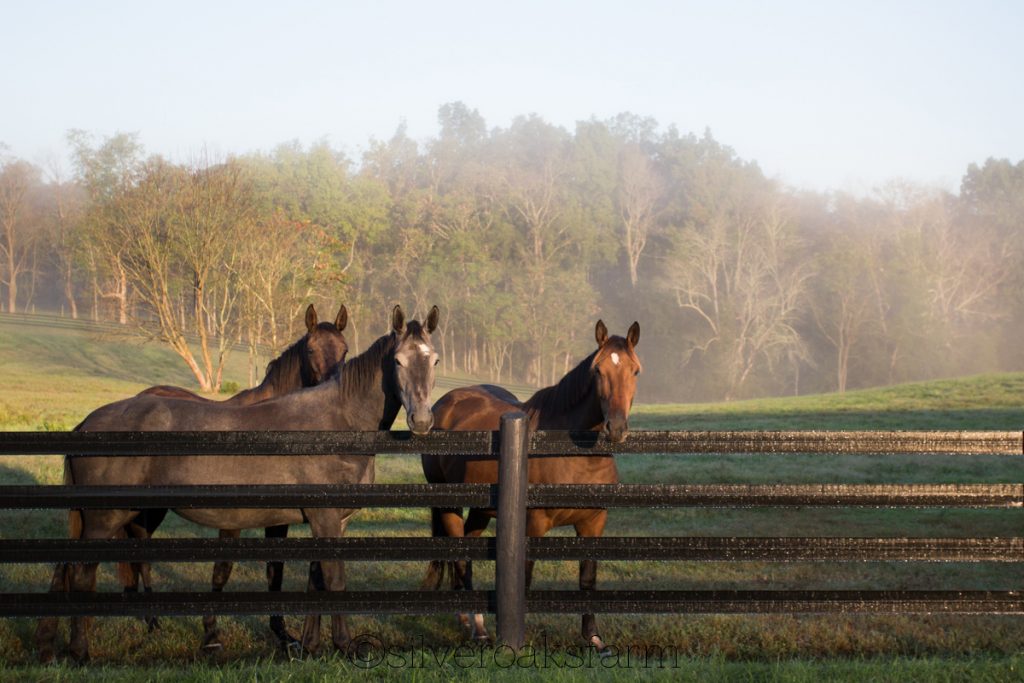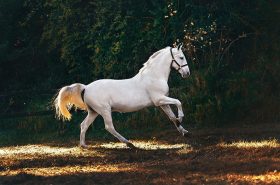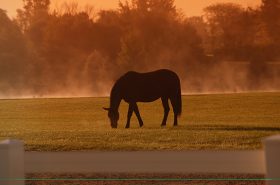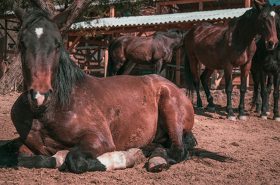Horses are big, powerful animals and need a substantial fence to keep them where you want them.
Growing up in southern California pipe corral panels were all I knew. I think they were so popular because they were readily available, held up in the weather, and they didn’t break the bank. Today, we have many more fencing options which is so nice.
Five years ago I was planning our horse property and I was starting with a blank slate. My barn and arena had a black exterior so I knew I wanted a black fence. I also knew I wanted a fence that looked beautiful and that would need little upkeep. And, maybe most important, I knew I wanted a fence that was going to be safe for my horses.
Types of Fencing
Pipe fencing ranges from galvanized pipe corral panels to continuous welded steel posts and rails. The nice thing with galvanized panels is they are easy to install, they don’t rust, and they are long lasting. Welded steel fencing is also long lasting but the steel will rust unless painted. Another con of both fencing is they have no give and horses may get injured if they run into the fence or kick the fence.
Wire mesh fencing is often used for horses. It needs wood posts and possibly a rail or two for support. The wire mesh is zinc coated which is important for resisting rust. It is also important that the mesh openings are small enough to keep horses from getting their feet caught. Wire mesh fence is also a great option if you have smaller animals like mini horses, goats, sheep, etc.
Flex fencing is an attractive rail fence made of flexible polymer. It usually comes in white, brown, and black. The maintenance is practically nothing. It is used with wood posts that can be painted or left natural. It has some give if a horse runs into it and tends to be a safe fence for horses.
Wood fencing can really be so charming and attractive. Wood can be left natural or it can be painted. Oak is the most popular type of wood used for fencing. The upkeep for wood fencing can be a bit more than other fencing. Replacing broken rails and painting are the biggest upkeep issues.
PVC rail fencing is usually white. The pro is it’s long-lasting and nice looking. The con is rails can break.
Electric fencing is often used alone in the form of temporary electrical tape or is used in the form of wire or rope with your permanent fence. Electrical tape can be installed with wood fence posts and attached with insulators or it can be used with plastic stakes that are temporary and easily moved. Hot wire or rope can be used with all permanent fencing and is attached with insulators. I highly recommend hot wire/rope be used with any fence set-up you have. Horse can be brutal on fencing. They are big, they like to rub on the posts, and hot wire will save your fencing!
Instagram Survey
I surveyed my Instagram followers to see what type of fencing they had for their horses. Wood rail fencing was the most popular with 61%. Flex rail fence came in at 23%, Pipe rail fence at 20%, Wire mesh fence at 33%, and 25% answered ‘Other’. Answers in the ‘Other’ category included electrical tape and a combination of wood, wire mesh, and electoral wire/rope.
My Farm Fencing
After having all these options for fencing I decided on the 525 flex fence from Ramm Fence. A friend of mine had this fence and I loved it. I really didn’t consider any other fencing for my farm. It is black (yay!) and looks beautiful, and the upkeep is practically nothing. It holds up in our crazy winters, and it very safe for my horses. A safe fence option was probably my biggest priority. I made my posts a little taller than most, so I used four rails, because I have bigger horses.
Visit @silveroaksfarm on Instagram to see images of my farm and fencing!
Visit @rammfence on Instagram to shop many fencing options for your farm!
**
Erin Gouveia of Silver Oaks Farm is an accomplished equestrian, award winning photographer, and an artist. She was born and raised in San Diego, California, graduated from Colorado State University, and now resides in Park City, Utah on a small ranch with her husband. She has had careers in Medical Research, Zookeeping, and most currently Photographer at Erin Kate Photography.
Follow Erin on Instagram at @silveroaksfarm and find her equestrian inspired fine art photographs and handmade goods in her Etsy shop SilverOaksFarm.
If you enjoyed this post we think you might like 5 Fence Options Designed to Keep Your Horse Safe




